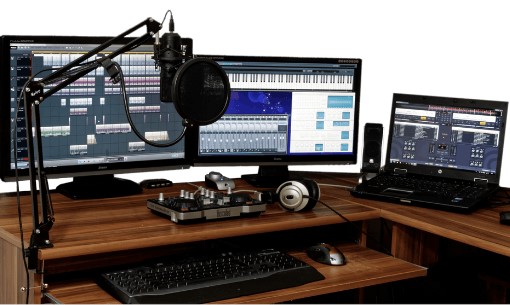Starting your own music studio from home can be a great way to earn an income while “doing what you love to do,” but it’s important to keep in mind that there will be some essential preliminary steps that you may not find to be very enjoyable. Of course, you should be prepared to do some considerable groundwork in any business endeavor, so it shouldn’t be surprising that the same will be required when launching a home studio.

However, some would argue that running a studio is a bit more difficult than operating a typical home-based business, as you’ll need the expertise and equipment to make your facilities worthwhile for up and coming recording artists who also have the option of using their own home setups. With that said, here are the most important things you’ll need to do to get going:
-
1. Creating an Optimal Acoustic Environment
Every studio should be built within a room that is acoustically treated and designed for optimal creative work flow. In general, larger spaces are better because they allow for more components, bigger recording booths and less opportunities for sound reflections. Luckily, with a bit of research, anyone can learn how to install an acoustic ceiling and walls using special sound absorption foam, bass traps, fixtures and other materials and techniques.
-
2. Taking Relevant Educational Courses
If you haven’t yet founded your studio professionally, there’s a good chance that you’re not yet on the level of many experienced studio managers and sound engineers. To be the person running a one-man show, you’ll need to brush up on your skills, whether you’re trying to satisfy clients or advance your own musical career. Fortunately, there’s no shortage of both free and paid educational options online, so it’s just a matter of setting your mind to it.
-
3. Incorporating the Business
Once you feel like you’re ready to start offering up your services and/or publishing your own music for sale, it’s time to officially incorporate your studio as an official business. Most home studios start out as a Limited Liability Corporation (LLC), but you may choose to operate as a Sole Proprietor or another kind of corporate entity depending on your preferences and intentions. This process is simple and can usually be completed in the span of a few days in any state for a nominal fee.
-
4. Advertising Your Services
After your studio is fully setup, you’re knowledgeable enough to manage it, and you’re ready to start making legitimate business transactions as a company, it’s time to get the promotional ball rolling. Networking with local musicians and singers is one way to get your brand’s name out there, and you may even want to consider providing complimentary services to artists during your downtime to stay productive.
-
Choosing a Good Location for the Studio
If you’re building a home studio, then it goes without saying that the location of your studio will be based on your residence, but it’s worth noting that you may want to consider moving to a new home if you currently live in a rural or sparsely populated area. In essence, the best place to set up a studio or any other kind of locally oriented service is within a highly populated city, so making that move might be the best course of action before you start investing so much time and money into a home studio that isn’t easily accessible to a large number of prospective clients.